Materials for the Medieval History of Indonesia
1041.00.00.

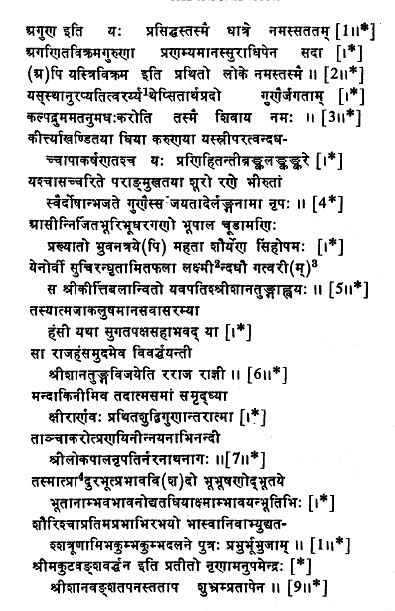
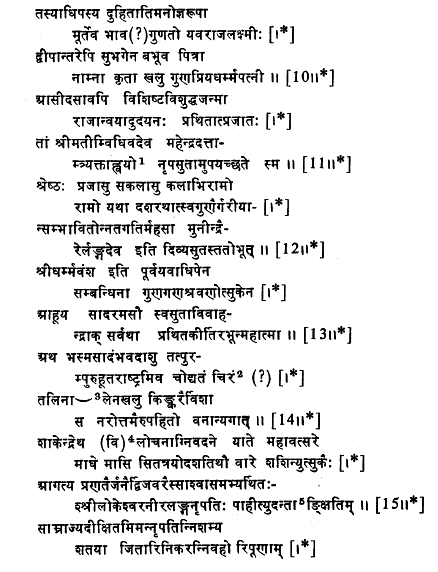
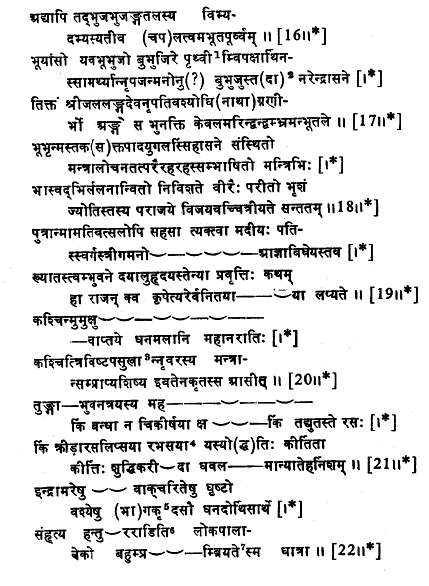
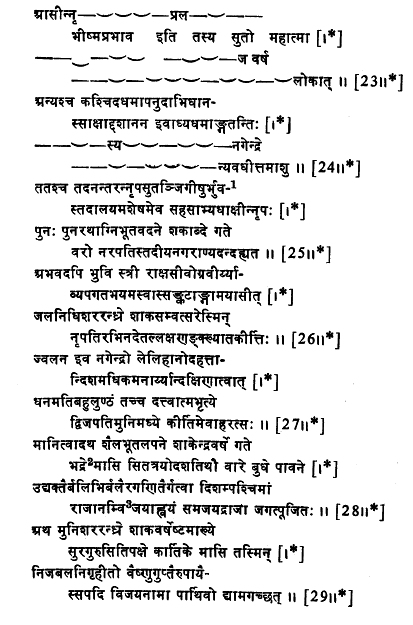
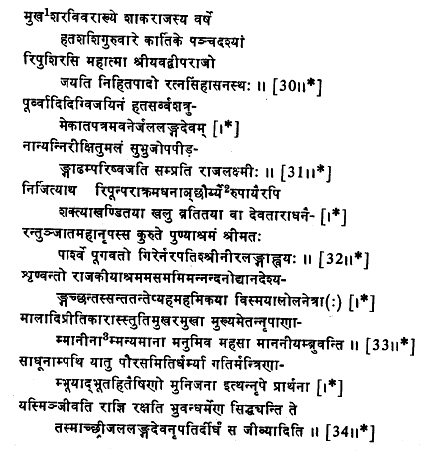
1. May honour be always given to the Creator who, in His creation and preservation, is endowed with all the three qualities (gunas), but is without any (aguna) at the time of destruction.
2. Honour be also to Him who is well known in the world as Trivikrama (Vishnu) and who is at all times saluted by the lord of the Devas (i.e. Indra) who is great on account of his immense prowess.
3. Honour to Siva who (in bounty) surpasses the wishgiving tree, who though called Sthanu (lit. motionless) moves with great speed and who through his qualities satisfies the desires of the living beings.
4. Victory be to king Erlangga who through his perfectly good reputation, intellect and merciful disposition follows the womankind, who through grasping the bow has got a deep stain in his hand and who though a hero in battle is guilty of cowardice in that he turns his back to immorality and in that way only is his virtue modified.
5. There was a king who was the crest-jewel of the protectors of the earth (i.e. kings), who had overcome a great number of kings and was renowned in the three worlds, who was likened to a lion in great courage, supported by whom for a long time the earth produced in immeasurable quantity and (thus) got a fast hold of the goddess of wealth who is transient (by nature) he was the ruler of Yava (Java) endowed with splendour, renown and power and bore the name of the illustrious Isanatunga.
6. His daughter, lovely on account of the purity of her mind and devoted to Sugata (Buddha) like unto a female swan which is lovely through its dwelling in the pure Manasa lake and possesses beautiful wings, was the princess Sri Isanatunga-vijaya who increased the joy of the king as the female swan does to the male swan.
7. Then king Sri Lokapala who was an excellent prince and was a delight to the eyes, whose mind displayed (only) pure qualities made her, who equalled him in splendour, his beloved (queen) even as the milk-ocean (Kshirasamudra) made Mandakini equalling in splendour its beloved.
8. From him there sprang a son excelling in power and (destined to be) an ornament of the earth. He for the welfare. of the people filled the earth with splendour with his mind directed to the meditation of Bhava. He was like Vishnu in incomparable brilliance, was fearless, and rising like the sun was ever ready to smash the foreheads of the elephants of his enemies as if they were (merely) earthen pitchers, and was the lord of kings.
9. This incomparable lord of men was known by the name of Sri Makutavardhana, who was the sun of the family of Sri Isana and shone out brightly in valour.
10. The very charming daughter of this prince, who through her excellence was like the Fortune incarnate of the ruler of Yava, received from her illustrious father the name of (?) Guna-priya-dharma-patni (the lawful wife of one to whom virtue is dear) which name was known even beyond this island.(1)
11. There was one Udayana born of an exceedingly pure race and sprung from a renowned royal family. It was he who lawfully married the illustrious princess Mahendradatta.
12. From them there sprang as Rama sprang from Dasaratha a beautiful son whose name was Erlangadeva. He was the best of all the people, was graceful in the practice of fine arts, and like Rama surpassing Dasaratha, was greater (than his father) through his excellent qualities and whose brilliant future was imagined by sages through his greatness.
13. He being respectfully invited by his kinsman Sri Dharmavamsa, the lord of East Java, who was anxious to hear of his various virtues, was given in marriage to his (Dharmavamsa's) own daughter. Thus forthwith the high-souled one became famous in every way.
14. Soon after that his (Dharmavamsa's) capital, where so long joyousness had ruled (?) even as in Indra's kingdom, was burnt to ashes. Then accompanied by a small band of horsemen (?) and best of servants he betook himself to the forest.
15. Then in the great year 932 according to (the era of) the lord of Sakas, in the month of Magha on the thirteenth day of the bright half on Monday, there came to the monarch Erlanga the subjects and principal Brahmins and bowing respectfully addressed this prayer to him: `Rule (ye) the earth to the extreme borders.'
16. When his numerous opponents heard that this prince, who had been anointed as the (future) emperor, had by his might, overcome the hosts of enemies, they also, being frightened of the grasp of his serpent-like arms, display even to this date an irresolute spirit which was formerly unknown to them.
17. Numerous princes of Java enjoyed the earth because they were supplanters of their rivals and by virtue of their royal birth their sons enjoyed (succession ?). But the prince Erlanga, born of a good family, and a leader among the potentates, while roaming about on this earth bears in his body only a couple of bitter enemies (which are the opposite conditions such as heat and cold, joy and sorrow, etc.).
18. Installed on his throne with his feet placed on the head of his vassals, consulted daily by his ministers who were devoted to the affairs of the state, he often takes his scat (in the court) with the ladies and surrounded by heroes (with) shining (arms). Even when a cause was lost it was always regarded as being won through his lustre (i.e. clear insight).
19. The widow of his enemy thus laments: My husband has, all of a sudden, abandoned my children and myself, though he loved us dearly, in order to visit the nymphs of heaven [...] obedient to your order. You are renowned in the world and are of pitying heart, how could you then act so differently? Oh king! where is your mercy?
20. Some great enemy (of this king) being desirous of emancipation [...] in order to obtain (?) the dirt of riches [...]. Another having obtained from this best of kings charm (or counsel), which should secure the happiness of heaven for himself, became as it were his (i.e. the king's) disciple.
21. [...] What is the use of ardent desire for sexual passion ? His high mind is praised and (his) glory which causes purification and which is pure is always held in honour.
22. (He was) like Indra among the gods, was bold (?) among the [...] was the giver of fortune to his servants, was like Kubera to the hosts of supplicants and in killing was like Yama. Verily the Creator chose him as one who had in himself (the qualities of all) the guardians of the quarters.
23. There was a king [...]. His noble son was called Bhishmaprabhava [...].
24. And another of the name of Adhamapanuda who like Ravana possessed good many feet (?)[...].
25. Then the king (Erlanga) desirous of overcoming this prince suddenly burnt his capital so that nothing remained of it. Then again when 953 years in the Saka era had passed, this excellent monarch burnt over and again many of his cities.
26. There was also in this country a woman of great power like a demoness. Undismayed he (i.e. Erlanga) drew near her perilous country. It was in the Saka year 954 that this king of great fame pierced this target.
27. Like a fiery serpent frequently darting out its tongue, he, through his ability, burnt the utterly uncivilised southern region. After having obtained much booty and distributed it among his servants, he only took away the glory for himself in the midst of the best of Brahmina and ascetics.
28. Thereafter imbued with ambition, when the year 954 of the Saka era had passed, in the month of Bhadra, on the thirteenth day of the bright fortnight on an auspicious Wednesday, this prince, who is honoured in the world, departed westwards with a vast army of heroic men who were ready for the fight and gained a complete victory over a prince named Vijaya.
29. There in the Saka year 957 on the eighth day of the dark half of Kartika on Thursday, the king Vijaya was seized by his own troops through the application of the means (of statecraft) as taught by Vishnugupta (Chanakya) and died soon afterwards.
30. In the year 959, of (the era of) the lord of the Sakas, on the new moon day of Kartika on Thursday, the noble and illustrious king of the island of Yava set himself on his jewelled throne with his feet placed on the heads of his enemies, and is now rejoicing in his victory.
31. And now the Royal Fortune unable to find anybody else, pressing with her fair armies, deeply embraces Erlangadeva, who has conquered all the directions, East and others, who has destroyed all his enemies, and who has now become the paramount ruler of the whole earth.
32. Then having subdued his enemies, who were rich in valour, by means of his prowess and statecraft, the king Erlanga, a great ruler by birth, in order to take pleasure in the worship of gods has now caused to be built, through his devotion or (to give an exhibition of his) unimpaired power, a holy hermitage on the slope of the excellent hill Pugavat.
33. Hearing of this incomparable royal hermitage which was almost like the pleasure garden of Indra, men vied with one another in going there without ceasing and looking with eyes expanded with wonder. They brought garlands, etc., as friendly presents and their mouths were full of praise. They considered this king as the foremost of all the princes deserving honour and as honourable as Manu through his eminence.
34. May the community of citizens wander along the path of the virtuous. May the course of the ministers be just. May the ascetics strive after the good of all beings. With regard to the king this is the prayer: Since all these (mentioned above) are possible when the king has a (long) life and governs the earth with justice, therefore, may the king, the illustrious Erlangadeva, live long.
first draft, not proofread /